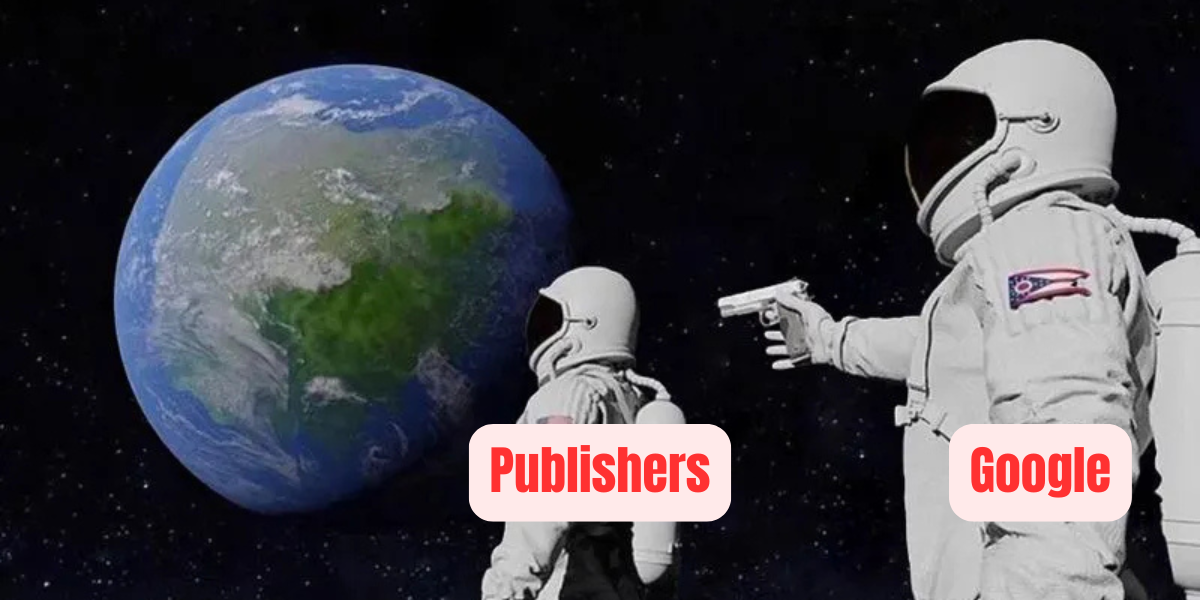The death of SEO has been greatly exaggerated. If you move in the same circles as me online, it’s all anyone seems to talk about right now. But SEO is not dead. Not for the vast majority of brands and businesses selling products or services online.
Things have changed. No question. Google’s SERPs have never looked worse. But that’s par for the course these days. Google went scorched-earth with its algorithm updates (the ones they publicly confirmed, anyway) in and around 2021, prepping us all for the carnage that was to come in 2023.
In 2025, the Google we knew in 2020 is dead. It’s just a mess of AI Overviews, adverts, and commercial pages. It reminds me of how search engines (minus the AI part, obvs) looked and functioned prior to Google properly organizing everything in the early 2000s.
Google’s HCU Update: The Nuke That Torched the Open Web
There’s been loads of BIG algo updates over the years. MEDIC was the last earth-shaker. I had clients lose 30% and 40% of their traffic. But as it turns out, we hadn’t seen anything yet…
The BIG one, the Chicxulub-grade update came in 2023. The Helpful Content Update (HCU).
I’ve been doing SEO and content marketing since 2009. I’ve worked through Panda, Penguin, Medic. But I have never seen an update like HCU; it was an extinction-level event, hence my reference to Chicxulub.
Information sites (AKA niche blogs) were hit the hardest. Ditto affiliate blogs. Millions of them were wiped out. Sites that were generating hundreds of thousands (sometimes millions) of pageviews per month dropped overnight.
And more followed in the months after.
Some tried to pivot. Some started new sites. Some just gave up entirely. I know site owners that went from 6 million pageviews and $100K/month to zero, just like that.

Only a tiny number of sites ever recovered from HCU. Maybe 0.1%. The rest? Still gone. Most will never recover.
Tens of thousands of jobs vanished. Content writers, editors, designers, SEOs, developers. The whole support system that made these sites run, they got smashed by this update too.
This was the collapse of an entire independent industry.
Google 2.0: Bad For Publishers, Manageable For Product and Service Businesses
AI Overviews is eating everyone’s lunch. Most reports say it’s cuts click-through rates by up to 30% which is a problem for all website owners. But if your site is geared more towards informational, question-answer queries, it’ll likely feel like a lot more.
The days of raking in free organic traffic from low-competition, long tail question-answer queries are over. This is AI Overviews’ job now.
Why Google No Longer Ranks Your Blog
Brands, e-commerce sites, and service companies still have plenty of visibility in Google, however, and the reason for this, in my humble opinion, is simple: they’re easier to vet from an E-A-T perspective.
They have different signals or identifiers than a straight-up blog. This makes “understanding” them as a web entity a lot easier for Google.
E-A-T is impossible to assess on a macro scale, of course, but there are telltale signs that differentiate a service or goods-based business from an info blog, and I believe this is one of the key reasons why so many sites were burnt during the HCU update.
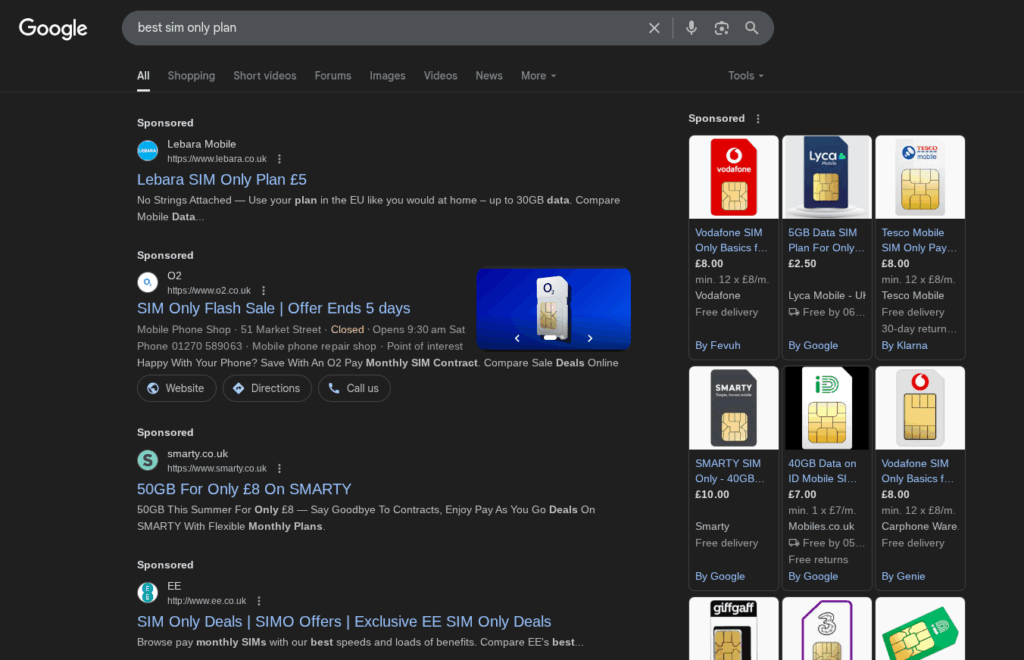
So while Google cannot vet every site’s E-A-T credentials, it can tweak its algorithm to look for certain things: payment gateways, product and/or service pages, off page mentions and citations, etc.
B2B and B2C sites have an address, sometimes a physical location, they have payment gateways on their site, sometimes they’ll have a knowledge graph, and if the product / service is popular they’ll have great off-page SEO too.
To do the same for a purely informational site is not easy. You need volume, a massive social media presence or a very popular podcast, and even then nothing is guaranteed.
The TL;DR for all this would appear to be that post-HCU, Google is only interested in websites that do something. They have to have a purpose behind them; it cannot be a purely informational play anymore.
Strategies To Recover From Google’s HCU Classifier
That’s why we’re advising our blogger clients to flip the model: build a product or service, then shape the content strategy around it.
Will this help you recover from HCU? Potentially. But there are no guarantees. The Helpful Content Update classifier, once applied to a site, is like a tattoo, it’s permanent and removing it requires a lot of time and pain.
We tried to help a few info blogs during 2023 and 2024; it didn’t go well. For this reason, we no longer take on HCU-hit blog sites. We just don’t know how to fix them. And I don’t want to take someone’s money when I know I probably cannot improve their situation.
But if you have been hit by HCU, my advice is simple: refocus your site around a product or service and do all you can to develop a brand that people like and talk about.
This approach tightens topical focus, reinforces entity authority, and unlocks more sustainable monetization. With product-market fit, a single sale can outperform thousands of ad impressions.
And now, this is exactly what Google seems to reward.
The Perfect Example of The Power of E-E-A-T In Action
One of our clients, a WordPress theme builder, hadn’t touched their blog in over a year. But they had excellent landing pages and a brilliant docs hub that covered their product extensively.
During the HCU roll-out, their traffic surged.
Why? Because they had a tightly focused site that covered everything a potential user needed to know. And nothing more. They weren’t going after anything outside their lane.
They had a small but very well executed YouTube channel, the developer of the theme often went on podcasts and other YouTube channels, and sentiment towards the theme itself was positive.
That’s strong off-page SEO signals, multiple traffic sources pointing to the site (YouTube, podcasts, X, Reddit, and other social media platforms), and a product people like and talk about online.
That’s basically how you win the E-E-A-T Olympics.
Once we stepped in, the data confirmed it: Search Console up, Ahrefs glowing green. Google wasn’t just ranking them; it looked like it was boosting them.
Pages were even ranking for unrelated queries.
We moved fast, tightened up their content strategy and within three months, traffic to key landing pages exploded.
Premium downloads jumped 40%.
New content was getting indexed instantly. Top 3 positions, usually within 90 minutes of publishing. AI Overviews started citing us, giving the client double visibility in the SERPs.
One page, barely 250 words, explained a Block Editor feature in two lines.
No examples. No detail. It didn’t even have a featured image.
But because it came from a product brand with a knowledge panel, it outranked a detailed editorial piece with more backlinks and better writing.
And no, it wasn’t a branded keyword; just a generic “What is X in WordPress Block Editor” query.
The takeaway? If your site sells something, it could be a tool, a plugin, a service, whatever, you’re what Google wants now.
And with HCU, it’s clear why: Google doesn’t need niche blogs to explain products anymore. The product site can do that itself. And if it can’t? AI Overviews will.
Google No Longer Wants to Send Traffic to Independent Publishers
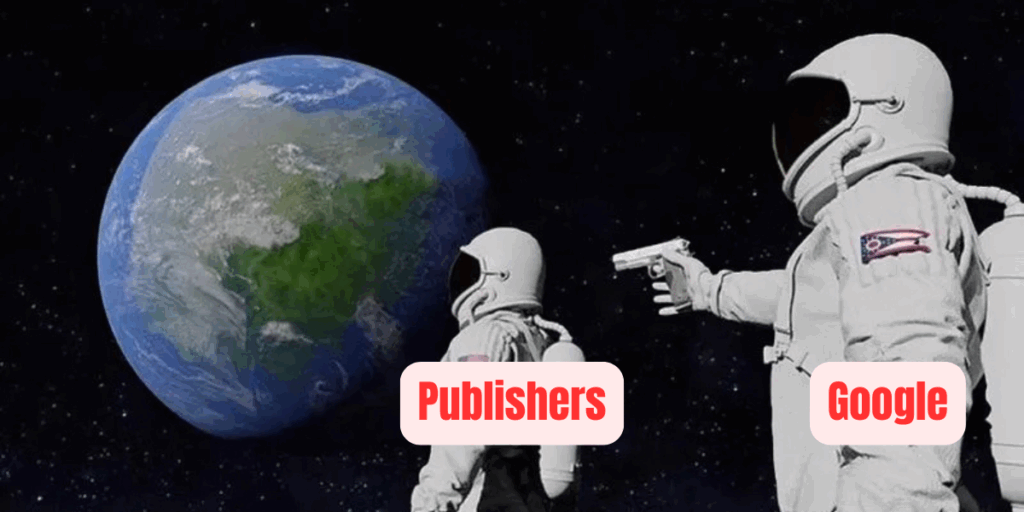
Now contrast that with another one of our clients from 2024: a tech blog that had been around for over 12 years. It had a strong brand, a vanity metric DA71, and loads of great content, proper authors, and regular, daily updates.
Tech Blog Slammed By The HCU Update
We did everything: technical audit, new content clusters, backlinks, internal linking, more link building, schema — the works, basically.
Nothing moved the needle. Not one new post got ranked higher than page 3 in Google. After six months, we’d managed a sluggish improvement of 12%. I then advised the client to maybe think about not continuing the campaign.
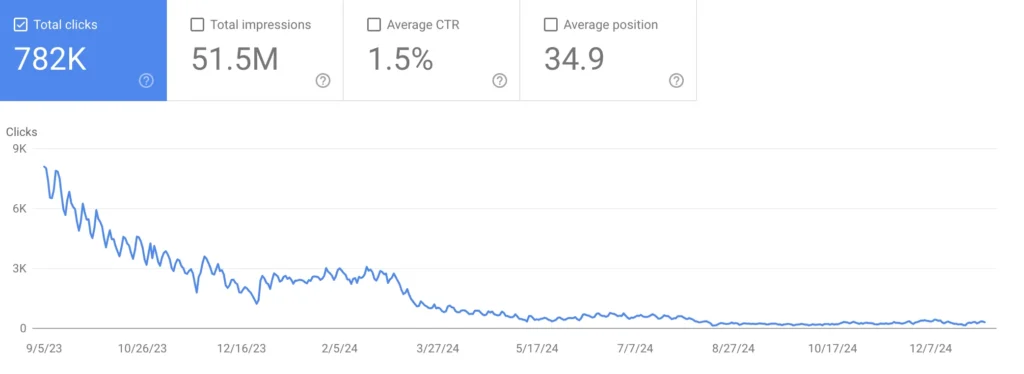
We did our best to improve the site’s chances of ranking and its visibility in Google. But the ROI was not there. Back when I ran sites for a living, I used plenty of SEO and marketing agencies. They were always happy to take my money, regardless of ROI.
We don’t do that. I don’t want to run that kind of agency, so I had a frank chat with the site owner. I told him we’d done literally everything we could from a technical and content perspective, and advised him to rebuild the site around a product or service, and then we parted ways.
It was one of the most depressing projects I have ever worked on. I felt terrible for the guy; he’d let his entire staff go. Friends, family members, people he’d worked with every day for 10+ years.
And to make matters worse, his site was actually great. The content was well written, no raw AI, and the site was designed beautifully.
But this is no longer enough, not in Google’s eyes.
If a DA71 tech blog with history, authority, and a team of decent writers can’t recover, what chance does a small indie publisher have? That’s the terrifying part. If this is the future of Google, the open web as we know it is finished.
The only businesses that Google appears to deem worthy of being in its search results are those that sell something.
And this is rather depressing. Especially for someone that owes pretty much everything they know about most things to reading articles and blog posts on Google.
Unfashionable as it is, I still like reading articles. I like discovering weird little corners of the internet. And with technical stuff, I ALWAYS use sites. Not YouTube or ChatGPT because it’s easier to read and follow instructions in a document setting.
ChatGPT is OK for basic stuff but if you ask it to do anything even remotely technical it gets it wrong about 85% of the time.
The only time it doesn’t is when you spend 20 minutes writing a prompt so it knows EXACTLY what you want it to do.
Then it’s great.
But I’d rather just save the 20 minutes and read a blog post that explains what I’m trying to do.
This is where websites come into play. Yes, some are terrible. Others far, far worse. But you cannot lump the entire open web in with the sites that exist to skim and scam.
If a legit site’s business model (free information paid for by adverts or affiliates) is no longer viable (which it doesn’t seem to be), what happens when they’re all gone? What will Google train its AI model on then? Who will be left to steal from?
The answer, even conservatively speaking, is probably an internet of content creators maybe half the size it is now in the space of the next 2-3 years.
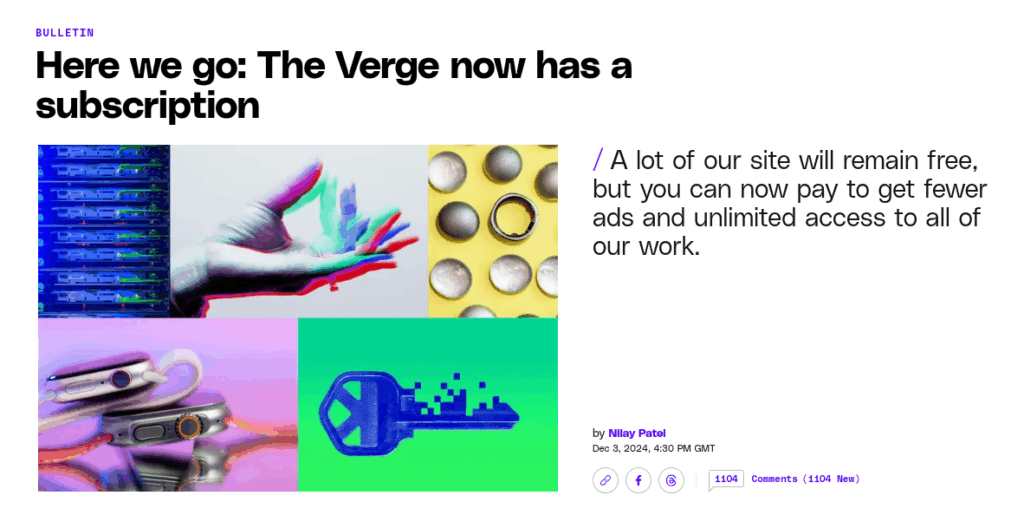
And all the big boys, the major news sites and established content platforms, behind paywalls. It’s happened already; even The Verge is moving towards a subscription model (though it’s not going too well) for parts of its site.
If you don’t want to pay for proper journalism, then pretty soon you’ll be getting all of your information from Big Tech’s large language models.
Isn’t that just about the worst possible case you could imagine for how the internet would die?
That it’d be controlled by a single entity pushing its own agenda, stealing IP from creators, destroying long-standing businesses overnight, gaslighting the industry about it, and making tens of billions a quarter in the process.
Welcome to the world of Google 2.0.
